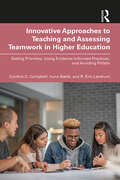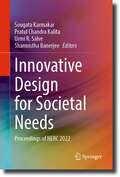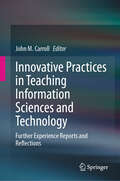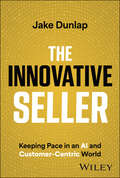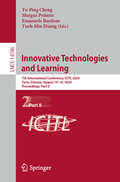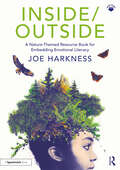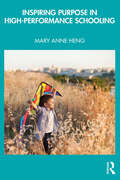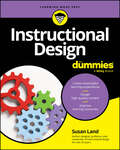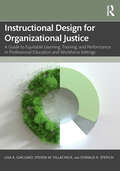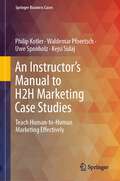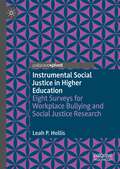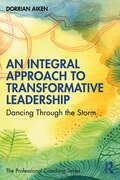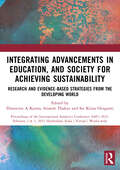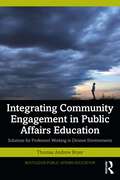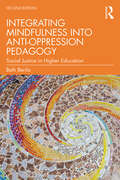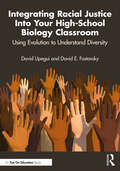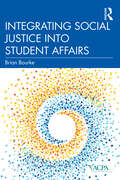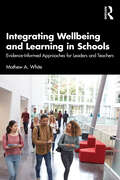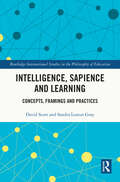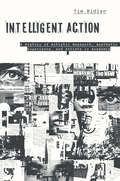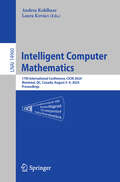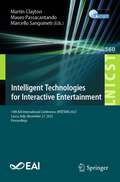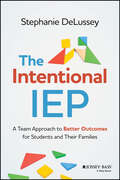- Table View
- List View
Innovative Approaches to Teaching and Assessing Teamwork in Higher Education: Setting Priorities, Using Evidence-Informed Practices, and Avoiding Pitfalls
by Cynthia G. Campbell Iryna Babik R. Eric LandrumThis guide will help instructors better understand the skills that underlie effective teamwork, offer strategies for structuring group projects, and provide advice on imparting the knowledge and support that students need to develop highly functional, advanced teamwork skills. Even instructors with a great deal of experience in structuring collaborative learning projects may recognize the gap that exists between their current efforts in providing students with teamwork experiences and effectively training students’ teamwork skills. By drawing on literature from the fields of organizational teamwork and teamwork pedagogy in higher education, the authors identify the processes associated with effective teamwork, relate these processes to teamwork in student teams, and distill and organize strategies for developing students’ teamwork knowledge, skills, and attitudes. Featuring evidence-informed tools, case studies, and best practices, this highly practical text provides everything higher education instructors need to target and advance their students’ teamwork competencies while maximizing the learning benefits of peer collaboration.
Innovative Design for Societal Needs: Proceedings of NERC 2022
by Sougata Karmakar Pratul Chandra Kalita Urmi R. Salve Sharmistha BanerjeeThis book presents select proceedings of North-East Research Conclave (NERC 2022) on innovative design for societal needs. Human Society and culture are a continuously evolving, complex, and intelligent system. The social needs of humans today are exacerbated by extremely unbalanced regional economic development and cultural identity crises across the globe and within states. This edited book presents cutting-edge research on how design innovation can be used to bring sustainable and meaningful social change. It also provides novel directions for future researchers interested in exploring the impact of design innovation and design thinking on human society. The book can be a valuable reference for beginners, researchers, and professionals interested in innovative design and allied fields.
Innovative Practices in Teaching Information Sciences and Technology: Further Experience Reports and Reflections
by John M. CarrollInformation Sciences and Technology (IST) is a rapidly developing, interdisciplinary area of university research and educational programs. It encompasses artificial intelligence, data science, human-computer interaction, security and privacy, and social informatics. In both research and teaching, IST ambitiously addresses interdisciplinary synergies across this broad foundation. Many articles and books discuss innovative research practices in IST, but innovations in teaching practices are less systematically shared. Although new programs and new faculty join IST each year, they basically have only their own imaginations to draw upon in developing effective and appropriate innovative teaching practices. This book presents essays by experienced faculty instructors in IST describing insights that emerged from teaching and learning classroom practice, and that have been validated through classroom experience. The book is intended to help develop and strengthen a community of practice for innovative teaching in IST.
The Innovative Seller: Keeping Pace in an AI and Customer-Centric World
by Jake DunlapPractical and straightforward solutions to everyday sales challenges In The Innovative Seller: Keeping Pace In An AI and Customer-Centric World, veteran sales leader and trainer Jake Dunlap delivers an expert playbook for sales that offers out-of-the-box and creative answers for the problems and questions that salespeople face every day. Fun and motivational, the book walks you through effective strategies for dealing with common challenges, like LinkedIn prospecting, sales transparency, cold calling, and others. The author has included a comprehensive tactical appendix, so you can easily identify and locate the exact solution you need when you encounter a specific problem. You’ll also find: Proven, grounded, and actionable techniques you can apply immediately to improve your sales performance Instructive stories and anecdotes drawn from Dunlap’s decades of sales and sales training experience Insightful discussions of how the typical sales process and model has changed over the years and how to adapt to the new realities of the disciplineAn engaging and eye-opening resource for early- and mid-career sales professionals, as well as business development and customer success practitioners, The Innovative Seller will also prove invaluable to managers and executives at quickly growing companies who seek to optimize their firms’ sales processes and results.
Innovative Technologies and Learning: 7th International Conference, ICITL 2024, Tartu, Estonia, August 14–16, 2024, Proceedings, Part II (Lecture Notes in Computer Science #14786)
by Yueh-Min Huang Emanuele Bardone Yu-Ping Cheng Margus PedasteThe two-volume set LNCS 14785 and 14786 constitutes the refereed conference proceedings of the 7th International Conference on Innovative Technologies and Learning, ICITL 2024, Tartu, Estonia, during August 14 -16, 2024. The 60 full papers included in this book were carefully reviewed and selected from 131 submissions. They were organized in topical sections as follows: Part One : Artificial Intelligence in Education; Computational Thinking in Education; Design and Framework of Learning Systems and Pedagogies to Innovative Technologies and Learning. Part Two : STEM/STEAM Education; VR/AR/MR/XR in Education; and Application and Design of Generative Artificial Intelligence in Education.
Innovative Technologies and Learning: 7th International Conference, ICITL 2024, Tartu, Estonia, August 14–16, 2024, Proceedings, Part I (Lecture Notes in Computer Science #14785)
by Yueh-Min Huang Emanuele Bardone Yu-Ping Cheng Margus PedasteThe two-volume set LNCS 14785 and 14786 constitutes the refereed post-conference proceedings of the 7th International Conference on Innovative Technologies and Learning, ICITL 2024, Tartu, Estonia, during August 14 -16, 2024. The 60 full papers included in this book were carefully reviewed and selected from 131 submissions. They were organized in topical sections as follows: Part One : Artificial Intelligence in Education; Computational Thinking in Education; Design and Framework of Learning Systems and Pedagogies to Innovative Technologies and Learning. Part Two : STEM/STEAM Education; VR/AR/MR/XR in Education; and Application and Design of Generative Artificial Intelligence in Education.
Inside/Outside: A Nature-Themed Resource Book for Embedding Emotional Literacy
by Joe HarknessInside/Outside is a unique educational resource for those working with young people of secondary school age, providing a variety of tried-and-tested indoor and outdoor lessons and activities to promote and embed emotional literacy. The book is divided into three accessible sections: emotions and feelings; self and situation; and mental health and wellbeing; which each cover a variety of themes, from anxiety and depression, to happiness, communication, and confidence. For each theme, ‘inside’ and ‘outside’ activities are offered, with inside activities inspiring students to self-reflect and develop empathy for others, and those outside drawing heavily on nature and learning outside the classroom. The ‘outside’ activities are adaptable and have been designed to work in any available outdoor space, and all activities can be used either in standalone lessons or sequentially, with introductory tasks, group activities, and circle time discussions. With a focus on equipping students with meaningful and tangible skills to support them in the recognition, identification, and expression of their emotions, Inside/Outside will be a valuable resource for teachers, youth workers, home-educators and anyone else looking to facilitate nature connection and introspection in children aged eleven to sixteen.
Inspiring Purpose in High-Performance Schooling (Routledge Research in Education)
by Mary Anne HengIs the world better off because your school is in it? Do you believe schooling has a higher purpose? In Inspiring Purpose in High-Performance Schooling, Mary Anne Heng questions modern-day schooling with its dominant focus on what is efficient and effective in good education and how this is measured. This book critically analyses what really matters in high-performance schooling contexts using Singapore as an example and makes a case for putting purpose at the heart of teaching.Going beyond good education built on evidence-based and reflective practice and the instrumental questions of the “What” and “How” of education, she argues for a view of education as transformation with a deeper purpose that probes the “Why”. Using Singapore as a case example and Israel as a counterpoint, she moves past the rhetoric of developing passion, curiosity, creativity and other 21st-century competencies in high-performance schooling to uncover children’s real experiences of school. Based on research using multiple sources, she analyses surveys with Singapore and Israeli adolescents and in-depth individual student interviews, as well as provides insights from rich discussions and extended field-testing with practicing teachers and educational leaders to inform an urgent call for a new vision in education for the future of education and society—one that celebrates achievement with larger purpose for the wider world.A valuable academic and resource text for teachers, school leaders, policymakers and graduate students in education programmes, as well as education researchers in the fields of educational leadership and change, curriculum, teaching and learning, and youth purpose.
Instructional Design For Dummies
by Susan M. LandThe streamlined, simplified, beginner-friendly introduction to instructional design Instructional Design For Dummies will teach you how to design and build learning content to create effective, engaging learning experiences that lead to improved learning outcomes and skill development. This book breaks down the instructional design process into bite-sized pieces, so you can learn techniques and best practices without getting bogged down in theory. Learn about various instructional design models and frameworks, then discover the different options for designing learning experiences. Take into account learning foundations, goals, and contexts, then create stellar lessons for in-person or virtual delivery. This Dummies guide is your starting place for creating impactful courses, without the technical jargon. Learn the basics of instructional design so you can create meaningful learning experiences Discover techniques that will help you design high-quality content for any context Improve learning outcomes and deliver training content with greater efficiency Skip the complex theories and technical jargon and focus on the info you need to knowThis book is perfect for anyone who needs to develop a course, design a curriculum or training program, or provide educational content without being formally trained in instructional design. It’s also a great supplement to college-level instructional design courses. Whatever you’re teaching, Instructional Design For Dummies will help you teach it better.
Instructional Design for Organizational Justice: A Guide to Equitable Learning, Training, and Performance in Professional Education and Workforce Settings
by Lisa A. Giacumo Steven W. Villachica Donald A. StepichInstructional Design for Organizational Justice prepares instructional designers to use culturally relevant, performance-based learning materials and environments that improve organizational and workplace learning experiences for today’s diverse, globalized contexts. With socially just leadership and DEI initiatives growing in institutions across sectors, today’s instructional design programs must prepare graduate students to be more culturally relevant, equity-minded, and inclusive in their professional practice. This textbook explores the implementation of systematic, systemic, and performance-oriented designs alongside the use of organizational justice theory to facilitate more equitable, inclusive performance improvement and workplace learning interventions.The book introduces the Learning and Performance Support Instructional Design (LeaPs ID) Model. Applicable to instructional designers, educational technologists, learning experience designers, learning engineers, and human resource development professionals, this original, iterative process: integrates common ID heuristics, design-based thinking, culture, equity, inclusion, and other inputs external to the organization and ID project; portrays a realistic, scalable, iterative, agile approach to the ID process; aids in the design of environments in which adult learners can observe, practice, and receive feedback, building the knowledge and capacity required for their desired performance; and is illustrated by a wealth of examples, templates, and processes developed in the field to support adult learners and collaborate with subject matter experts. Relevant to business, government, military, non-profit, non-governmental, and higher education settings, this unique and comprehensive volume lends itself to uncovering values and motives essential to successful agile project management as well as to diversity, equity, and inclusion initiatives and social change.
An Instructor's Manual to H2H Marketing Case Studies: Teach Human-to-Human Marketing Effectively (Springer Business Cases)
by Philip Kotler Waldemar Pfoertsch Uwe Sponholz Kejsi SulajThis is an instructor's manual for the popular textbook 'H2H Marketing: Case Studies on Human-to-Human Marketing' (Springer, 2023). The authors have provided a perfect companion that enables teachers to adopt a case-by-case approach when using the material in the classroom.'H2H Marketing' focuses on redefining the role of marketing by reshaping the mindset of decision-makers and integrating concepts such as Design Thinking, Service-Dominant Logic, and Digitalization. By following this carefully designed manual, teachers can assist their students in gaining a deeper understanding of the case studies that illustrate various aspects of the concept, its fundamental elements, and its implementation.
Instrumental Social Justice in Higher Education: Eight Surveys for Workplace Bullying and Social Justice Research
by Leah P. HollisThis book offers eight validated instruments on workplace bullying to support robust mixed methods approaches for social justice research. Workplace bullying is an excellent starting point from which scholars can consider social justice research. The data shows that marginalized and disenfranchised groups (minoritized groups, women, junior faculty, and the LGBTQ+ community) are disproportionately affected. The outcomes included career interruption and severe health disparities. Though there is a demand for workplace bullying instruments, the book also lays a foundation for creating surveys to address these populations more effectively.
An Integral Approach to Transformative Leadership: Dancing Through the Storm
by Dorrian AikenThis essential new book is a practical "how-to" guide to enhancing the quality of relationships between leaders and individuals in organisations – the proven key to maximising performance, building resilience, and retaining talent. Integral vision, seen through each of the four quadrants described in this book, gives access to a range of perspectives, irreducible to one another but each significant in adding a kaleidoscope of understanding to a topic or body of knowledge. The author draws on recent research which focuses on Integral theory and emphasises the benefits to an organisation, including cultivating, at several levels, leaders and teams through coaching, improving the quality of meetings, introducing an understanding of emotional intelligence, and more recently, addressing adult stages of development. The book also demonstrates how the Integral quadrants can bring clarity to interpersonal and cross-sector communication, especially in diagnosing, planning, and implementing team and organisational strategy. The concepts and practical skills explored in this book will be a valuable resource for senior leaders, human resources specialists, and in-house and external coaches focusing on leadership development, as well as students and trainers of coaching.
Integrating Advancements in Education, and Society for Achieving Sustainability: Research and Evidence-Based Strategies from the Developing world
by Sai Kiran Oruganti Dimitrios A. Karras Srinesh ThakurThis book is the collection of selected articles that appeared at the First International Analytics Conference 2023 held in Hyderabad in virtual mode on February 2nd the 3rd 2023. In an era defined by the twin imperatives of knowledge and sustainability, this compelling volume explores the powerful synergy between advancements in education and the transformation of society towards a more sustainable future. Delve into the heart of progress as educators, innovators, and change-makers come together to catalyze positive change. Within these pages, you’ll witness the transformative potential of education as it equips individuals with the skills, knowledge, and perspectives necessary to address the multifaceted challenges of sustainability. Discover groundbreaking pedagogical approaches, innovative technologies, and visionary programs that are revolutionizing learning and inspiring the next generation of leaders.Simultaneously, the book sheds light on the interconnected relationship between education and society, illustrating how an informed and engaged citizenry is driving sustainable practices, community resilience, and global change. From eco-conscious urban planning to social entrepreneurship, it showcases the societal initiatives that emerge when education and sustainability combine forces.‘Integrating Advancements in Education and Society for Achieving Sustainability’ is a compass for those navigating the path towards a brighter, more sustainable future. Join us in this thought-provoking exploration of how education and society are jointly shaping the way we think, act, and work together to achieve a harmonious balance with the world around us.
Integrating Community Engagement in Public Affairs Education: Solutions for Professors Working in Divisive Environments (Routledge Public Affairs Education)
by Thomas Andrew BryerCommunity engaged universities prepare students to participate in societies in ways that are inclusive. This book presents a coherent argument for higher education institutions not only to encourage students to engage in their communities, but also to develop themselves as community engaged institutions. Analyzing the design and implementation of community engaged teaching and learning practices, author Thomas Bryer explores training in democratic practices and envisions a future in which higher education institutions are better prepared to cope with democratic backsliding.Teaching and professional development cases are woven throughout—developed, adapted, and enhanced by the author over a period of years—and grounded in the great debates happening today. Integrating Community Engagement in Public Affairs Education is a culmination of multiple years of experimentation with different approaches to teaching future and practicing public sector leaders the tools of democratic engagement. The text is grounded in a case‑based design that spans undergraduate, Master’s, and Ph.D. students, as well as local government managers, offering concrete examples of teaching and learning strategies that promote public value and measurable social impact. The book closes with practical strategies for publicly engaged scholars to effectively educate the next generation of students about democratic engagement within divided communities. It will be required reading for public administration faculty, as well as practicing public administrators and those who provide training to them.
Integrating Mindfulness into Anti-Oppression Pedagogy: Social Justice in Higher Education
by Beth BerilaDrawing from mindfulness education and social justice teaching, this book explores an effective Anti-Oppression pedagogy for university and college classrooms. Authentic classroom discussions about oppression and diversity can be difficult; a mindful approach allows students to explore their experiences with compassion and to engage in critical inquiry to confront their deeply held beliefs and value systems. This engaging book is full of practical tips for deepening learning, addressing challenging situations, and providing mindfulness practices in anti-oppression classrooms. In this fully revised edition, Dr. Berila positions discussion in the current context and expands exploration of power and implicit bias, transformative learning, and trauma. Integrating Mindfulness into Anti-Oppression Pedagogy is for all higher education professionals interested in and teaching Social Justice pedagogy that empowers and engages students in the complex unlearning of oppression.
Integrating Racial Justice Into Your High-School Biology Classroom: Using Evolution to Understand Diversity
by David Upegui David E. FastovskyIn this guide, educators and authors David Upegui and David E. Fastovsky offer a pedagogical prescription for how you can integrate the study of racial justice with evolutionary biology in your existing high-school biology curriculum. Designed as a practical manual for teaching, the chapters focus on teaching concepts of equity through evolutionary biology modules, a cornerstone for building students’ scientific understanding of biotic diversity. The book provides pedagogical components alongside historical and scientific components, with contextual chapters that give teachers the background knowledge to understand the historical relationship between science and racism for topics such as natural selection, social justice, and American slavery and colonization. Ready-to-use lesson plans are situated in a historical and theoretical context of science as it relates to racial oppression, and demonstrate how rigorous science education can lead to your students’ liberation and personal empowerment despite the historically problematic history of some applications of science. These lesson plans and classroom exercises are presented in a way that introduces the timely extra dimension of anti-racism into the existing biology curricula without significantly increasing teaching loads. The contextual material provided allows the lessons to be implemented across a variety of classrooms regardless of initial familiarity with DEI. Ideal for secondary biology teachers and their students, particularly in grades 10-12, this book synthesizes timely ideas for high-school educators, harnessing the power of rigorous science to combat marginalization. Lessons and activities have been classroom-tested and are aligned with three different standards: Next Generation Science Standards (NGSS); College board (AP Biology); Vision and Change; and use the 5E format.
Integrating Racial Justice Into Your High-School Biology Classroom: Using Evolution to Understand Diversity
by David Upegui David E. FastovskyIn this guide, educators and authors David Upegui and David E. Fastovsky offer a pedagogical prescription for how you can integrate the study of racial justice with evolutionary biology in your existing high-school biology curriculum.Designed as a practical manual for teaching, the chapters focus on teaching concepts of equity through evolutionary biology modules, a cornerstone for building students’ scientific understanding of biotic diversity. The book provides pedagogical components alongside historical and scientific components, with contextual chapters that give teachers the background knowledge to understand the historical relationship between science and racism for topics such as natural selection, social justice, and American slavery and colonization. Ready-to-use lesson plans are situated in a historical and theoretical context of science as it relates to racial oppression, and demonstrate how rigorous science education can lead to your students’ liberation and personal empowerment despite the historically problematic history of some applications of science. These lesson plans and classroom exercises are presented in a way that introduces the timely extra dimension of anti-racism into the existing biology curricula without significantly increasing teaching loads. The contextual material provided allows the lessons to be implemented across a variety of classrooms regardless of initial familiarity with DEI.Ideal for secondary biology teachers and their students, particularly in grades 10-12, this book synthesizes timely ideas for high-school educators, harnessing the power of rigorous science to combat marginalization. Lessons and activities have been classroom-tested and are aligned with three different standards: Next Generation Science Standards (NGSS); College board (AP Biology); Vision and Change; and use the 5E format.
Integrating Social Justice into Student Affairs
by Brian BourkePushing back on the critique that social justice is often just a buzzword in student affairs, this book provides guidance on how to truly make social justice a fundamental part of student affairs.Shaped by voices of student affairs educators and up-to-date literature, Bourke offers guidance on how to approach social justice effectively and confidently as a student affairs educator. This book provides discussion of the core concepts connected to social justice, strategies for making social justice part of one's practice, and guidance on how to infuse social justice into practice throughout the field. Each chapter features reflection and discussion questions, as well as suggestions for further reading aiming to provide readers with fresh perspectives on how to center social justice in student affairs.Filled with extensive research, practical measures, and engaging prompts, this book serves as a launchpad for student affairs educators to be intentional with their practice and put words into action.
Integrating Wellbeing and Learning in Schools: Evidence-Informed Approaches for Leaders and Teachers
by Mathew A. WhiteIntegrating Wellbeing and Learning in Schools argues that wellbeing research can help address the hurdles that school leaders face by incorporating a more interdisciplinary approach from contemporary governance, leadership, and management. The COVID-19 pandemic has accelerated the problem of the wellbeing learning poverty cycle in schools worldwide. This book makes the case for a new and comprehensive integration of wellbeing in school governance, leadership, and teaching theories across disciplines during the recovery phase of the COVID-19 pandemic. It argues for operationalising wellbeing goals and integrating these into evidence-informed professional practice. Drawing on evidence-informed wellbeing education, teaching theories, and original research, the book comprehensively considers the integration of wellbeing education from the perspectives of school governance and leadership, middle management, teachers, student leadership, and the students themselves. This book will be of interest to postgraduate students of education leadership, educators, and school leaders.
Intelligence, Sapience and Learning: Concepts, Framings and Practices (Routledge International Studies in the Philosophy of Education)
by David Scott Sandra Leaton GrayExamining the idea of intelligence in its diverse sociological and philosophical formations, Intelligence, Sapience and Learning explores the multiple and often complex meanings associated with the concept of intelligence, and its relationships with learning, curriculum and sapience. Scott and Leaton Gray explain a series of key concepts central to understanding the meta-concepts and practices of intelligence, learning and curriculum. These concepts include epistemology, free will and volition, hermeneutics, pragmatism, strong normative evaluations and pedagogy, amongst others. Focusing on six praxes that form a genealogy of the concept of intelligence, Scott and Leaton Gray argue for a re-framing of the concept and practice of intelligence, with profound consequences for how modern societies should be organised and how people should live their lives. This book is a follow-up to Women Curriculum Theorists: Power, Knowledge and Subjectivity, and takes a fresh look at the concept and practice of intelligence. It will appeal to curriculum theorists and those with an interest in curriculum and learning matters, as well as those working in the philosophy and sociology of education.
Intelligent Action: A History of Artistic Research, Aesthetic Experience, and Artists in Academia
by Timothy RidlenThrough archival research and analysis of artworks by Gyorgy Kepes, Allan Kaprow, Mel Bochner, and Suzanne Lacy, among others, Intelligent Action examines how these artists brought alternatives to dominant conceptions of research and knowledge production. The book is organized around specific institutional formations—artistic research centers, proposals, exhibitions on college campuses, and the establishment of new schools or pedagogic programs. Formal and social analysis demonstrate how artists responded to ideas of research, knowledge production, information, and pedagogy. Works discussed were produced between 1958 and 1975, a moment when boundaries between media were breaking down in response to technological, cultural, and generational change. In the context of academia, these artistic practices have taken up the look, feel, or language of various research and teaching practices. In some cases, artists bent to the demands of the cold war research university, while in others, artists developed new modes of practice and pedagogy. Reading these works through their institutional histories, author Tim Ridlem shows how artistic research practices and artistic subjectivity developed in the long 1960s within and alongside academia, transforming the role of artists in the process.
Intelligent Computer Mathematics: 17th International Conference, CICM 2024, Montréal, QC, Canada, August 5–9, 2024, Proceedings (Lecture Notes in Computer Science #14960)
by Andrea Kohlhase Laura KovácsThis book constitutes the refereed proceedings of the 17th International Conference on Intelligent Computer Mathematics, CICM 2024, held in Montréal, Québec, Canada, during August 5–9, 2024. The 21 full papers presented were carefully reviewed and selected from 28 submissions. These papers have been categorized into the following sections: AI and LLM; Proof Assistants; Logical Frameworks and Transformations; Knowledge Representation and Certification; Proof Search and Formalization & System Descriptions.
Intelligent Technologies for Interactive Entertainment: 14th EAI International Conference, INTETAIN 2023, Lucca, Italy, November 27, 2023, Proceedings (Lecture Notes of the Institute for Computer Sciences, Social Informatics and Telecommunications Engineering #560)
by Martin Clayton Mauro Passacantando Marcello SanguinetiThis book constitutes the refereed proceedings of the 14th International Conference on Intelligent Technologies for Interactive Entertainment, INTETAIN 2023 which was held in Lucca, Italy, during November 27, 2023.The 15 full papers presented in this book were selected from 56 submissions. They present novel and innovative work in areas of methods (machine learning, movement), computer-based systems (architectures, software, algorithms), and devices (digital cameras, smartphones). The papers are grouped in sessions of thematic issues on Games and Game-Based learning; Motion Capture; Sports and Competitions; and Interfaces and Applications.
The Intentional IEP: A Team Approach to Better Outcomes for Students and Their Families
by Stephanie DeLusseyLearn how to put together IEPs with the power to make a real difference for students The Intentional IEP shows special education teachers how to successfully collaborate with all stakeholders—parents or guardians, general ed teachers, therapists, and beyond—to work toward students’ success. Too many of us aren’t trained to write the Individualized Education Programs that help millions of students with thrive in school. This book fills that training gap, explaining the importance of assembling an IEP team and inviting this team to confront and improve its current processes and habits to make IEP writing simpler and more effective. With all the pressures that educators are under, it’s easy to cut corners when it comes time towrite IEPs. Writing them in isolation, leaving them to the night before, making decisions without consulting data and research, letting family collaboration fall to the wayside—most special educators have made these mistakes at some point. The Intentional IEP equips you with the resources you need to feel confident in approaching IEPs the right way, including prioritizing the many competing demands you face so you can find the capacity to show up for your students. This book offers: Clear, step-by-step solutions for all IEP members that can easily be implemented at any time during the school year Collaboration strategies for IEP teammates to rely on one another for expert and professional knowledge Tools and reproducibles to strengthen practices and overcome common hurdles Direct advice from a veteran special education teacher who has seen what a difference collaboration in the IEP can make for studentsThe Intentional IEP is a timely resource for special education teachers, general education teachers, and support staff, as well as teachertraining programs. Parents and guardians with students will also benefit from this clearly written guide to the IEP.
